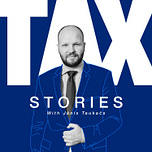There is a video option of this conversation, too, on the Tax Stories YouTube channel.
Anna
Anna Gunn is a consultant specialised on tax ethics and tax communication (trainings, advising board meetings), a lecturer of tax ethics at Maastricht University & University of Curacao, a blogger on these topics, has been for 8.5 years with a Big4, studied at the Universities of Cambridge and Leiden. On many occasions I thought that we are a bit alike in our searches of creative expressions and simplicity of the complex tax matters.
Top 3
If I need to pick 3 take-aways from the conversation:
Anna’s Christmas stories (and here) on her blog page are really special (an automatic translation to English works well);
Tax Governance Code - what does it normally consists of and why companies may need it;
The future of letterbox companies - if I cannot explain to an ordinary person why the company is needed then you probably won’t be able to defend them infront of tax authorities or judges.
In the podcast you will learn about:
her recommendations from the studies of modern medieval languages:
Elckerlijc (Everyman, late 15 century); Anna believes it made a more fundamental impression on her than she initially thought... and it explains the Christmas story, with the demons and angels...
also the bit she likes from Faust (Part I);
I've studied now Philosophy
And Jurisprudence, Medicine,
And even, alas! Theology
All through and through with ardour keen!
Here now I stand, poor fool, and see
I'm just as wise as formerly.
her blogs - what readers can find there, why Anna is blogging since she left PWC at 2015 and for whom;
what are her amazing Christmas stories on her blog about;
her non-business projects;
help to those who cannot afford tax help;
Once the full scale of the scandal came to light, Prime Minister Mark Rutte's government resigned. In addition to the penalty, the Dutch data protection agency also fined the Dutch tax administration €2.75 million in December 2021 for the “unlawful, discriminatory and therefore improper manner” in which the tax authority processed data.
Tax Knowledge Building Foundation - demand-driven training to developing countries on their taxation matters;
the decision to leave the Big4 - if you want to be independent, don’t borrow much;
teaching in Curacao;
anti-avoidance provisions from the perspective of Curacao (Curacao is still on the EU Black list for not implemented CRS system);
the reason for the bad publicity of offshore jurisdictions; the role of banks in disclosing AML issues and illegal funds;
sources of tax ethics;
do the terms like honest and adequate need a definition?
It takes some courage to decide in the boardroom ‘we can save money with some fancy transfer pricing, but we’re just not gonna do it’. Businesses often are not doing this despite ESG and other fancy publications on their web pages.
Tax Governance Code as signed by many multinationals;
what’s in the code and why adopting the code could be good for companies;
the investigative journalists could keep companies to be accountable for it;
moral substance over legal substance;
are companies in practice improving with their ethical behavior?
the future of tax systems regarding ethics - what needs to be done and what will be done?
future of letterbox companies - can I explain to an ordinary person why the company is needed?
















Share this post